
 |
|
Paparazzi (2004) Cast: Cole Hauser, Robin Tunney, Tom Sizemore, Dennis Farina, Danel Baldwin, Tom Hollander, Kevin Gage, Blake Bryan, Andrea Baker, Jordan Baker, Lauren Birkell, Kelly Carlson, Fay Masterson, Sal Lopez, Chris Rock, Matthew McConaughey, Vince Vaughn, Mel Gibson 2004 – 85 minutes Rated: Reviewed by Dustin Putman, September 4, 2004. 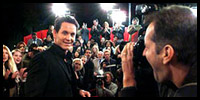 With the media—television shows like E!'s "Celebrities Uncensored," tabloids, and entertainment magazines—more popular than ever in today's society, and many celebrities recently speaking out about the out-of-control, potentially dangerous ways of the paparazzi, who will stalk them to get pictures, "Paparazzi" comes as a timely motion picture with some provocative themes. As directed by Paul Abascal and written by Forrest Smith (both making their feature debuts), it is a substandard thriller more interested in exploiting its subject matter than exploring it in any legitimate way. "Paparazzi" begins as a stalking suspenser, a 'la 1987's "Fatal Attraction," 1992's "The Hand That Rocks the Cradle," and 2002's "Swimfan," before transforming into an ugly revenge tale (think 2004's "Man on Fire" without the brain cells and rationality). At no time does it work, providing cheap thrills, bad writing, and a particularly nasty side that tries to pass itself off as popcorn entertainment.
With the media—television shows like E!'s "Celebrities Uncensored," tabloids, and entertainment magazines—more popular than ever in today's society, and many celebrities recently speaking out about the out-of-control, potentially dangerous ways of the paparazzi, who will stalk them to get pictures, "Paparazzi" comes as a timely motion picture with some provocative themes. As directed by Paul Abascal and written by Forrest Smith (both making their feature debuts), it is a substandard thriller more interested in exploiting its subject matter than exploring it in any legitimate way. "Paparazzi" begins as a stalking suspenser, a 'la 1987's "Fatal Attraction," 1992's "The Hand That Rocks the Cradle," and 2002's "Swimfan," before transforming into an ugly revenge tale (think 2004's "Man on Fire" without the brain cells and rationality). At no time does it work, providing cheap thrills, bad writing, and a particularly nasty side that tries to pass itself off as popcorn entertainment.
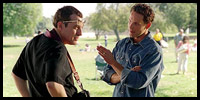 Bo Laramie (Cole Hauser) is a hot young actor with an adoring wife, Abby (Robin Tunney), and a precocious son, Zach (Blake Bryan), who has just hit the Hollywood big-time. When a snafu at Zach's soccer game leaves forceful paparazzi Rex (Tom Sizemore) with a black eye and Bo throwing the punch, Rex vows to make the actor's life a living nightmare. But following a paparazzi-caused car accident that leaves Zach in a coma and Abby seriously injured, Bo turns the tables on Rex and seeks to put an end to him and his slimy cohorts (Daniel Baldwin, Tom Hollander, Kevin Gage).
Bo Laramie (Cole Hauser) is a hot young actor with an adoring wife, Abby (Robin Tunney), and a precocious son, Zach (Blake Bryan), who has just hit the Hollywood big-time. When a snafu at Zach's soccer game leaves forceful paparazzi Rex (Tom Sizemore) with a black eye and Bo throwing the punch, Rex vows to make the actor's life a living nightmare. But following a paparazzi-caused car accident that leaves Zach in a coma and Abby seriously injured, Bo turns the tables on Rex and seeks to put an end to him and his slimy cohorts (Daniel Baldwin, Tom Hollander, Kevin Gage).
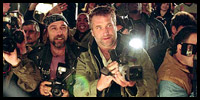 Viewing the film as a "Death Wish"-style vengeance thriller vacant of any thoughts outside of its violence, "Paparazzi" is passable but strictly forgettable. For once, however, the PG-13 offers up enough that is grisly (subjectively, not physically) to satiate most exploitation fans. Where "Paparazzi" unravels is in Bo's invalid reasoning for going after the gang of unhinged paparazzi. Had Bo accepted his lot in life as a Hollywood star and ignored Rex's cameras as real-life celebrities try to do, there would be no true conflict and, therefore, no movie. Instead of seeking security, restraining orders, and police help, save for that of the suspicious Detective Burton (Dennis Farina), Bo opts to concoct a deadly web for the paparazzi responsible for the near-fatal car crash. As viewers, we are supposed to root for Bo and cheer him on when he dispatches of his adversaries, but his despicable criminal conduct makes him no more innocent than those harassing him.
Viewing the film as a "Death Wish"-style vengeance thriller vacant of any thoughts outside of its violence, "Paparazzi" is passable but strictly forgettable. For once, however, the PG-13 offers up enough that is grisly (subjectively, not physically) to satiate most exploitation fans. Where "Paparazzi" unravels is in Bo's invalid reasoning for going after the gang of unhinged paparazzi. Had Bo accepted his lot in life as a Hollywood star and ignored Rex's cameras as real-life celebrities try to do, there would be no true conflict and, therefore, no movie. Instead of seeking security, restraining orders, and police help, save for that of the suspicious Detective Burton (Dennis Farina), Bo opts to concoct a deadly web for the paparazzi responsible for the near-fatal car crash. As viewers, we are supposed to root for Bo and cheer him on when he dispatches of his adversaries, but his despicable criminal conduct makes him no more innocent than those harassing him.
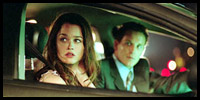 From a technical standpoint, the film is a mess. The opening narration is laughably stilted. The editing by Robin Russell (2000's "Battlefield Earth") lacks the smooth rhythm and flow necessary to draw the viewer in and make them care. The characters are one-dimensional pawns, with some written so over-the-top that they simply can't be taken seriously. As Rex, the head of his paparazzi gang, Tom Sizemore (2003's "Dreamcatcher") does everything but stroke his mustache to alert the viewer he is the villain. One suspects, however, that he would have even done that had he had facial hair below his nose. Sizemore takes the role of a pushy celebrity photographer that could have potentially hit home and reminded of actual paparazzi lurking in L.A. and makes him a strict caricature.
From a technical standpoint, the film is a mess. The opening narration is laughably stilted. The editing by Robin Russell (2000's "Battlefield Earth") lacks the smooth rhythm and flow necessary to draw the viewer in and make them care. The characters are one-dimensional pawns, with some written so over-the-top that they simply can't be taken seriously. As Rex, the head of his paparazzi gang, Tom Sizemore (2003's "Dreamcatcher") does everything but stroke his mustache to alert the viewer he is the villain. One suspects, however, that he would have even done that had he had facial hair below his nose. Sizemore takes the role of a pushy celebrity photographer that could have potentially hit home and reminded of actual paparazzi lurking in L.A. and makes him a strict caricature.
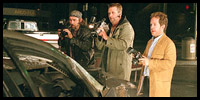 In his first major lead role, Cole Hauser (2003's "2 Fast 2 Furious") is acting safely below his natural charisma and intensity because there is little for him to work with. As wife Abby, Robin Tunney (2003's "The In-Laws") gets to look worried and stand by her man. It's a thankless part. A number of cameos, including a wordless one from Mel Gibson (who, amazingly, has produced this claptrap), attempt to invigorate some scenes but mostly just call attention to themselves while taking you out of the central plot. Odd, too, that Bo has seemingly begun filming a sequel to an action picture that has barely been released yet. Rarely does it work this way in Hollywood, especially when it comes to an actor who hasn't yet fully established himself as bankable.
In his first major lead role, Cole Hauser (2003's "2 Fast 2 Furious") is acting safely below his natural charisma and intensity because there is little for him to work with. As wife Abby, Robin Tunney (2003's "The In-Laws") gets to look worried and stand by her man. It's a thankless part. A number of cameos, including a wordless one from Mel Gibson (who, amazingly, has produced this claptrap), attempt to invigorate some scenes but mostly just call attention to themselves while taking you out of the central plot. Odd, too, that Bo has seemingly begun filming a sequel to an action picture that has barely been released yet. Rarely does it work this way in Hollywood, especially when it comes to an actor who hasn't yet fully established himself as bankable.
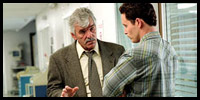 There may be tiny kernels of truth in the way "Paparazzi" portrays a celebrity's relationship with the media that hounds them, but more often than not director Paul Abascal opts for exaggeration over realism. It is just as well. "Paparazzi" is inconsequential, stupid, and cliched to the max, its most effective mise en scene a direct rip-off of a similar climactic moment in 1991's "The Silence of the Lambs." To be sure, even when the film works, which is rare, it is out of cinematic theft rather than actual creativity. "Paparazzi" is a pile-up of irresponsible notions acting as a frivolous diversion. It isn't painful to watch, but it sure does make you feel unclean for having sat through it.
There may be tiny kernels of truth in the way "Paparazzi" portrays a celebrity's relationship with the media that hounds them, but more often than not director Paul Abascal opts for exaggeration over realism. It is just as well. "Paparazzi" is inconsequential, stupid, and cliched to the max, its most effective mise en scene a direct rip-off of a similar climactic moment in 1991's "The Silence of the Lambs." To be sure, even when the film works, which is rare, it is out of cinematic theft rather than actual creativity. "Paparazzi" is a pile-up of irresponsible notions acting as a frivolous diversion. It isn't painful to watch, but it sure does make you feel unclean for having sat through it.
|
© 2004 by Dustin Putman |














